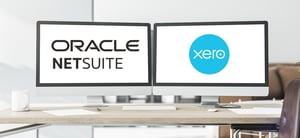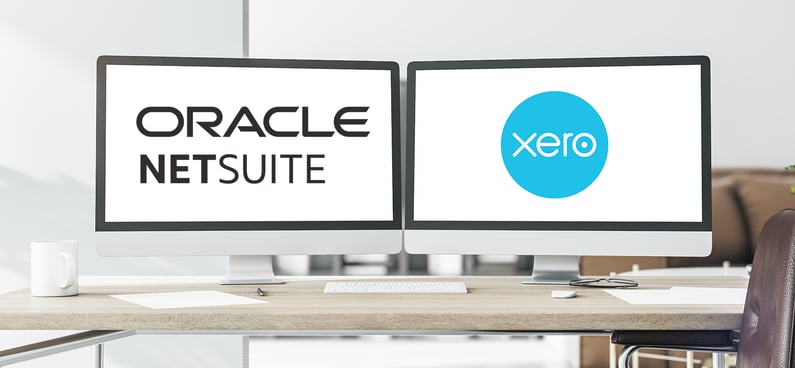Stay up to date with the latest technology trends and research from our ERP solution specialists.

Netsuite Vs Xero Differences
What is the difference between Xero and NetSuite?
In this article, we will set out the differences between Xero and NetSuite, and comparethem both to help you decide which one is right for your business.
Xero and NetSuite are both cloud-based accounting software solutions, but they have different features and target markets. Xero is designed for micro businesses, while NetSuite has a comprehensive range of features that are designed for businesses ready to go to the next level of growth.

Key differences between Xero and NetSuite
So, Netsuite Vs Xero. NetSuite and Xero are both popular accounting software solutions, but they have a number of key differences.
NetSuite is an enterprise resource planning (ERP) system, while Xero is a cloud-based accounting software. Over 40,000 businesses globally use NetSuite and according to Anchor Group, 66% of businesses report increased operational efficiency since implementing NetSuite.
This means that NetSuite is designed to manage all aspects of a business, including accounting, inventory, CRM, and order management. Xero, on the other hand, is primarily focused on accounting and financial management.
83 % of companies meet or exceed their ERP ROI expectations when proper planning, objectives and ROI analysis are done pre-implementation.
Xero Features
Xero offers a wide range of accounting features including:
- invoicing
- expense tracking
- payroll
- bank reconciliation
- financial reporting
NetSuite offers a wider range of features including:
- accounting
- inventory management
- customer relationship management (CRM)
- e-commerce
- business intelligence
Target Market
Xero is designed for micro businesses, while NetSuite is designed for small, medium or large business looking for their next level of growth. Xero is more simplistic for the smaller businesses, but NetSuite offers a wider range of features and customisation options which will help propel business growth.
Flexibility
Xero offers limited flexibility, while NetSuite offers bespoke options to suit your business and growth plan. If you need a tailored accounting software, NetSuite is the ultimate choice.
Which software is right for you?
The best way to decide which software is right for you is to consider your specific needs. If you are a micro business looking for an easy-to-use and simple accounting software, Xero is a good option. If you are growing business looking for an ERP software with the wide range of features noted above, NetSuite is a good option.
If you’re looking for more information about our NetSuite services, then please don’t hesitate to have a call with us, no obligation, just a chat to see what NetSuite can do for your business.
Here is a table that summarises the key differences between Xero and NetSuite:
| Feature | Xero | NetSuite |
| Target Market | Micro Businesses | SMB, Medium and Large |
| Functionality | Accounting, payroll, bank reconciliation, financial reporting | Accounting, inventory management, CRM, e-commerce, business intelligence |
| Flexibility | Limited flexibility options | Extensive flexibility options |
| Support | English-speaking support only | Global Support |
Here are some additional things to consider when choosing between Xero and NetSuite:
- Scalability: Xero is a good choice for businesses that starting out, but it may not be able to scale to meet the needs once a business starts to grow. NetSuite is designed to scale with your business, so it is a good choice for businesses that expect to grow significantly in the future.
- Integration: Xero integrates with a limited range of third-party applications while NetSuite integrates with a wealth of third-party applications and has it's own AppStore - NetSuite SuiteApps.
- Support: Xero offers English-speaking support only. NetSuite offers global support.
Cloud Solutions with Catalyst ERP
At Catalyst ERP, we are proud to be a NetSuite partner and certified consultant in the UK. Our team of experienced consultants specialises in providing comprehensive NetSuite consulting and managed services to help businesses of all sizes empower their operations and achieve their goals.
The Key Benefits of NetSuite ERP
Unified Business Platform
NetSuite ERP centralises core business functions such as:
- finance
- inventory
- supply chain
- order management
- CRM
- ecommerce
- HR and more
All in one system with a single source of real-time data. This eliminates disconnected systems and reduced manual data entry and errors.
Real-Time Visibility & Reporting
NetSuite ERP software gives companies real-time access to financials, KPIs, inventory, sales and operations via dashboards and analytics. This helps leaders make faster, data-driven decisions and spot trends or issues early.
Automation & Operational Efficiency
Routine tasks - such as invoicing, order processing, reporting, and procurement - are automated, reducing manual work, accelerating cycle times and boosting productivity.
Scalability & Growth Support
Designed to scale from fast-growing SMEs to large enterprises, NetSuite lets businesses add users, modules and entities without migrating systems. It supports multi-subsidiary, multi-currency and multi-language operations through NetSuite OneWorld.
Cloud-Native & Lower IT Burden
As a true cloud (SaaS) solution, NetSuite eliminates upfront infrastructure costs and reduces IT maintenance and upgrades - Oracle handles updates and hosting. This lowers total cost of ownership and frees internal IT resources.
Enhanced Collaboration
With all teams accessing the same live data on one platform, departments can collaborate more effectively - improving communication, alignment and responsiveness.
Better Financial Management
NetSuite’s financial modules cover budgeting, forecasting, general ledger, AP/AR and reporting. Businesses gain accurate, audit-ready financials, support for compliance and improved cash-flow visibility.
Advanced Analytics & Custom Reporting
NetSuite’s analytics tools and dashboards enable deep insights into performance across departments, helping to identify inefficiencies and growth opportunities.
Customer Experience & CRM Integration
Integrated CRM capabilities mean sales, marketing and service teams share customer data - enhancing customer relationships, personalised service and sales forecasting.
Get in touch today
To learn more about how NetSuite Cloud ERP can help scale your business, schedule a time that suits you with our Sales Director, Rob Scambler.




